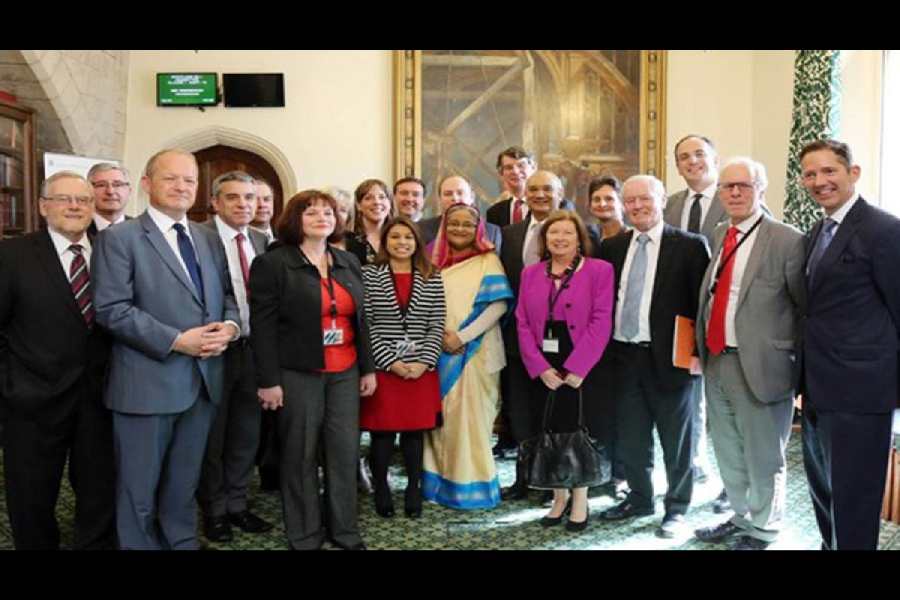There is a happy picture of Sheikh Hasina Wazed from June 2015 visiting the House of Commons with her niece Tulip Siddiq.
Hasina was the Prime Minister of Bangladesh at the time. After resigning as head of government on Monday, she is reported to have left the country with her younger sister, Sheikh Rehana, who is Tulip’s mother.
The general expectation is that there is no other place Hasina can go to other than London. It will be almost home from home.
“She will be safe here,” a source with good knowledge of the 6,50,000-strong Bangladeshi community told The Telegraph.
“The community is very split,” the source added. “There are a lot of extremists in the community. They don’t like the fact that the Bangladeshi high commissioner in London, Saidi Muna Tasneem, a Hasina appointee, is a woman. There will now be a question mark over her future. The high commission staff have not been given any instructions. The BNP here is quite pleased. The Awami League didn’t expect this. They are in disarray.”
But there is — or was — also a solid Awami League base in the UK. “There were a lot of good things that Hasina did in the early years but with the killing of the students, she has clearly lost the moral high ground. She was obsessed with her father’s legacy and bringing his killers to justice. But I have heard reports in London that the students were infiltrated by the Islamists and by the ISI.”
Hasina knows London well, having been a regular visitor to the UK over the years. In many ways the whole liberation struggle back in 1971 was planned in London.
In a way, history is repeating itself.
When Hasina’s father, Sheikh Mujibur Rahman, was released at the end of the Bangladesh war after spending nine months in a jail in West Pakistan, he arrived in London on January 8, 1972, on an RAF VC10. At his press conference in London, he explained: “I had no choice. I was a prisoner of Mr Bhutto.”
Mujib was welcomed to 10, Downing Street by Ted Heath, then Prime Minister, and also by the Labour Opposition leader, Harold Wilson. On his way back to Dhaka, Mujib stopped over in Delhi to thank Indira Gandhi.
There is real concern in the foreign office in London that Bangladesh will slip back into army control or see a takeover by Islamists.
That will pose a dilemma for the Bangladeshi-origin politicians in Britain. At the last election, there were 32 candidates of Bangladeshi origin of whom four, all women and from the Labour party, were elected.
Apart from Tulip, there is Rushanara Ali, Rupa Huq and Afsana Begum.
Tulip, whose constituency, Hampstead and Highgate, includes some of the wealthiest residential streets in London, has been given a middle-ranking ministerial job by Prime Minister Keir Starmer as economic secretary to the Treasury. Her contacts, especially in the City of London, will be helpful to her aunt. But Tulip is slightly under a cloud at
the moment.
As the Daily Mail pointed out: “A Treasury minister has apologised after breaking MP rules over her financial interests. Tulip Siddiq failed to declare income from a London rental property for more than a year. All MPs are required to register interests within 28 days. Ms Siddiq made a name for herself campaigning for the release of Nazanin Zaghari-Ratcliffe from Iran, but was criticised for staying silent on human rights abuses in Bangladesh. Ms Siddiq, now the Economic Secretary to the Treasury, has been reported to the Parliamentary Standards Commissioner over the breach.”
But luckily for Hasina, this is not a resignation or sacking matter.
Among profile Bangladeshis, the political opinions of two highly regarded novelists, Monica Ali and Tahmima Anam, authors of Brick Lane and The Good Muslim respectively, may also count as Britain makes up its mind about
developments in Bangladesh.
On June 13, 1971, an article in the Sunday Times exposed the brutality of Pakistan’s suppression of the Bangladeshi uprising. It forced the reporter’s family into hiding and changed history.
Written by Anthony Mascarenhas, a Pakistani reporter, it exposed for the first time the scale of the Pakistan army’s campaign to suppress its breakaway eastern wing in 1971. He had to leave Pakistan and seek a new life in Britain, although the Sunday Times never gave him a staff job.
Back in March 1971, Simon Dring, then a 26-year-old reporter with The Daily Telegraph in London, alerted the world to the Pakistani army’s massacre in East Pakistan with a front page scoop, “Tanks Crush Revolt in Pakistan. 7,000 slaughtered.”
The paper didn’t go in much for making heroes of its staff correspondents but it did note that Dring had broken the story at great personal risk to himself: “Telegraph reporter escapes net.”
Hasina’s expected arrival in London is just the latest chapter in the blood-soaked history of Bangladesh. British TV viewers were told that the toppling of Sheikh Mujib’s statue was rather like the pulling down of Saddam’s after the Gulf War.










